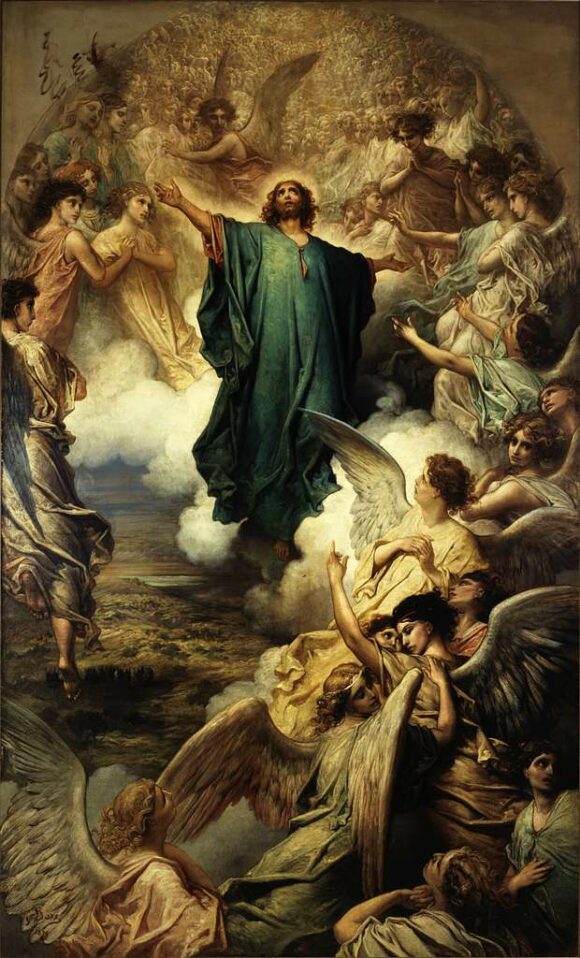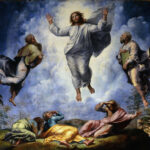The Ascension of the Lord (Year A)
This is when Jesus Christ bids farewell to his people and ascends to Heaven. In this very unique case an anomalous inversion takes place: the First Reading takes the central role, with a narration that features Christ himself; the Gospel is relegated to a supporting role, representing only a sort of minor development.
They appear to put forward two contrasting narratives: according to the Gospel of Matthew, the Eleven Apostles are sent to Galilee, where they finally meet their Master again. Instead Luke makes an exception to the internal logic of his book, and opens the Acts of the Apostles with an episode that still involves Jesus himself; Jesus even tells them not to abandon Jerusalem (which cannot be further from sending them to Galilee!) and then makes an exit rising spectacularly through the clouds, in a way that, for the easily impressed, could resemble an alien being carried away with a tractor beam, to a flying saucer or something…
I’ll now essentially point you to what was already discussed in previous episodes, dealing with discrepancies, evaluating credibility: this is a difficult subject and I’m not able to seriously discuss it here, but the kind of motivation behind the personal witnessing by the Apostles and the first Christians is amply demonstrated by their propensity to face martyrdom, while the differences in the chronologies and story details prove beyond doubt that no one had the power or the will to change the accounts to harmonize them.
Since I cannot say I find a significant reason both for the narrative importance of going to Galilee for a sort of rendezvous with Jesus, and for the opposite command to stay in Jerusalem, I am led to believe that neither of those two circumstances can be put into question, a priori, as being tendentious fabrications; they seem to simply reflect separate fragments of a complex series of events, reported perhaps in a less than accurate fashion, and then presented with accents placed on distinct, apparently contrasting aspects. Over the course of 40 days, which is a reasonable time span for several reasons, there can be multiple trips and meetings. We must be aware of the fact that history is not entirely linear, without being caught unprepared when confronted regarding problematic content found within the sparse accounts of those tense and frantic days.
However, this being said on the peculiar relationship between the First Reading and the Gospel, allow me to move on to something else.
In between the other two, as Second Reading, we find a passage from Paul’s letter to the Ephesians which demonstrates very well, through a recognizable style (even to a non-specialist reader) that we aren’t dealing with extemporaneous exhortations or personal doctrines: everything seems to refer to a well established catechesis. Paul draws on pre-existing formulas, which follow a rabbinic style that facilitates memorization. The whole shows a musicality, an almost poetic form, so much so that at a certain point in modern editions the verses are broken in chunks and the words wrapped to better render the rhythm of this crescendo. For example, notice:
what hope,
what riches,
what greatness.
Nothing transcendental, but there’s a method in here.
This passage teaches us about the glory of Christ,
whom the Father has set above every power and above every name, past and future. He’s the apex, the culmination of Creation: not only of anything that is in existence, but also of anything that may or should be: in him is found the fulfillment of anything and everything.
Think about it! Of everything! These words fall easy on the ears of the faithful during a celebration; one feels at home among people who gladly accept the bombastic proclamations of the Scriptures without even paying too much attention to them: like a visitor to cellars and wine bars who isn’t surprised in the least, let alone annoyed, the umpteenth time he hears talk of tannins, hints of red fruits, minerality.
“seating him at his right hand”… and one thinks: “Yes, yes, I’ve heard this one many times!”
But it’s quite another thing to take these words seriously, without reservations, for a modern man or woman.
The entire Universe has in this guy – who appeared just before the Resurrection as a humble human being – its fulcrum, the center of everything, the meaning of everything.
For us today, after a journey of cultural growth that was anything but trivial (a development that was born out of the Gospel of the downtrodden), perhaps it isn’t hard to find in Christ a much needed meaning for the life of Henrietta Tubble from Relieveuself-on-Avon, who died of tuberculosis in 1616, soon to be forgotten, even by her relatives. And we find meaning and comfort even for your neighbor who doesn’t know how to sort out the mess that is his broken family.
With Jesus, God leaned over us and -surprisingly- was able to make us feel touchingly close.
It’s a whole different story to see in a crucified man from 2000 years agojjjjjjjjjjjjjjjjjjjjjjjjjjj, who possibly – as they insist – resurrected, the fulcrum and the source of meaning for a universe that contains at least hundreds of billions of galaxies, each with hundreds of billions of stars, which exist for billions of years (and which could be part of something much bigger, as if this wasn’t enough).
The Ascension.
He left our small and insignificant planet and flew to the Heavens, to the Father, the Creator of all things, visible and invisible.
The Heavens? The same sky that the intellectual vulgarity of the Soviet Communist Party wanted to trivialize, making Yuri Gagarin say that when he went into space he didn’t met any god at all (it must be said that Gagarin himself did not see things this way)?
We have a book here that uses this image, of Jesus who ascends, then a cloud takes him away from view: a remarkable, effective way to leave the scene in style.
We need to to look at this in mature terms, as a completely reasonable way of representing the situation (Jesus’ departure towards an incomprehensible dimension) to the man of his time: once properly contextualized, this doesn’t mean at all that our faith is based on a pathetically pre-scientific idea of the world.
In fact, when people become sophisticated and begin to understand things differently, they may fail to understand the gap between the value of the religious phenomenon itself and the way it is depicted. Just because today the very idea of Jesus going up, in the sky, to reach Heaven, seems so primitive, that doesn’t mean that this whole story loses its value.
By now it’s not uncommon to find people who believe they have “proved” that our Faith is hopelessly stupid, just because they have discovered “errors” in the Bible: as if we ourselves believed in things like Noah’s Ark materially saving all animal species…
No, ladies and gentlemen, the Bible is not scientifically exact, at all; but what matters instead is the concepts it intends to teach us: on those, on the message, it’s never wrong. Let’s hold this basic concept firm, and we won’t be impressed by the style, or the use of scenic details or scientifically invalid words.
Of course, it’s still mystifying to contemplate Jesus Christ abandoning… our planet (actually, this universe).
As believers we must be aware that one of tomorrow’s challenges is precisely this. Recovering this local dimension of the incarnation, if seen from the perspective of someone who’s looking at the Universe (I am thinking for example of a criticism coming from Richard P. Feynman).
An incarnation that we find bewildering, for how God gets down to our level.
We need to find a place for this incarnation while the observed world no longer has 4 corners and a vault of fixed stars, but is terrifyingly boundless and annihilates us in our insignificance.
The first step consists in not seeing in Jesus only a character in a story, fit for our mind and imagination, but in bringing our understanding of him back to where it belongs: God, far beyond the visible dimension. Probably incarnated multiple times, in other contexts, far from ours, through other stories of salvation.
Thinking about these things should make your head spin. Even the story of Jesus, as a human being on planet Earth, seems so dizzyingly crushed by the size of the countless galaxies, by the number of possible inhabited worlds…
When I was just a boy I found myself reflecting on John 10, 16:
And I have other sheep that are not of this fold (sheep pen); these too I must bring
To me, many years ago, it seemed probable that this was a reference (unimaginable, for the evangelist) to further incarnations on distant planets.
Years later I then discovered that Vittorio Messori, the great writer whom I have already mentioned as an inspiration (if I can even dare speak on these terms: he sold millions of books, all of them religious essays: he’s an international phenomenon), had spoken about this concept in one of his books (a collection of articles), titled La Sfida della Fede (The Challenge of Faith).
In that Messori recounts having quoted this evangelical passage during an interview with the late Father George V. Coyne, the Jesuit astronomer director of the Vatican Observatory. Messori suggested that those words, if other intelligent beings were ever found, could shine through a new, mysterious light. As reported, Father Coyne, the scientist and priest, was caught off guard and replied that he had never thought about it.
Here I must say, with all the affection and admiration that I could possibly express, that Messori, the valiant, usually sharp journalist and author, well… for once… showed an excessive optimism, indeed downright naivety. In fact, dealing with those concepts, for example when speaking of the silence of radio telescopes that couldn’t find any aliens (yet!) and discussing the (perhaps?) unbridgeable distances of space, he was too quick to jump to a reassuring answer: we’re alone and that’s OK, or possibly the Love of God is even more fruitful, so much so that he has thought of a creation even more vast and wonderful than we could expect…
It’s obviously hard to guess if there are other intelligent species, but there should be some startlingly high numbers (even if separated from us by unfathomable distances in time and space) in relationship to our expectations and comfort zone.
For this reason, in contrast with the triumphalism shown by Messori, I would say that, indeed, people tend to chase the thought away and avoid this topic, because -except for the astronomers who find solace in toying with their scientific pet ideas- we find it disturbing, even without bringing religious convictions into play.
The main challenge for our faith, in the long game, once the current crisis of the Church has passed (which is probably the greatest crisis in history, therefore in fact not very suitable to be treated as a secondary issue, an afterthought…), will be that of confronting the new world, made of boundless space, probable aliens, artificial intelligences, while human beings are downgraded and humiliated in every possible way…
There’s a tough challenge awaiting us, crossing these new roads: we’re called to be there for others, to leave a mark; as believers, as Christians, as Catholics; definitely not letting modernity off the hook, avoiding the seductive thought of an escape to a more reassuring past. Proud of the depth of our faith, unwilling to negotiate on matters of substance; and at the same time ready to expand our horizons, to understand which radical innovations require the effort to update our vision substantially, redefining our perception of man and society.
We must continue to look to Christ. Which also means finding value in our miserable lives, as he did. Without chasing the temptation to simply give up and say: nowadays everything has become so hard… it’s impossible to bear, please come back soon!

The Ascension as portrayed by Gustave Doré










































